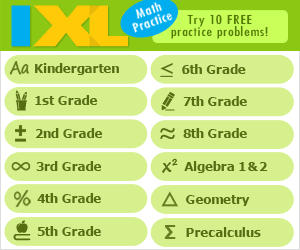SAT/ACT Vocabulary List for 06/21/2010
Here is today's word list:
- abase (v.): To lower in position, estimation, or the like; degrade.
- acrid (adj.): Harshly pungent or bitter.
- allot (v.): To assign a definite thing or part to a certain person.
- antidote (n.): Anything that will counteract or remove the effects of poison, disease, or the like.
- assent (v.): To express agreement with a statement or matter of opinion.;
- beget (v.): To produce by sexual generation.;
- brethren (n.): pl. Members of a brotherhood, gild, profession, association, or the like.
- cataclysm (n.): Any overwhelming flood of water.
- colloquialism (n.): Form of speech used only or chiefly in conversation.;
- conjunction (n.): The state of being joined together, or the things so joined.
- corporeal (adj.): Of a material nature; physical.
- Decameron (n.): A volume consisting of ten parts or books.
- depository (n.): A place where anything is kept in safety.
- discard (v.): To reject.
- divisor (n.): That by which a number or quantity is divided.
- eligible (adj.): Qualified for selection.;
- epitaph (n.): An inscription on a tomb or monument in honor or in memory of the dead.
- expect (v.): To look forward to as certain or probable.
- fief (n.): A landed estate held under feudal tenure.
- freshness (n.): The state, quality, or degree of being fresh.
- granary (n.): A storehouse for grain after it is thrashed or husked.
- hoard (v.): To gather and store away for the sake of accumulation.;
- impassive (adj.): Unmoved by or not exhibiting feeling.
- inconsiderable (adj.): Small in quantity or importance.
- innumerable (adj.): Countless.
- intrude (v.): To come in without leave or license.
- keepsake (n.): Anything kept or given to be kept for the sake of the giver.
- linear (adj.): Of the nature of a line.
- malignant (adj.): Evil in nature or tending to do great harm or mischief.
- microscopic (adj.): Adapted to or characterized by minute observation.;
- mordacious (adj.): Biting or giving to biting.
- nomination (n.): The act or ceremony of naming a man or woman for office.
- onset (n.): An assault, especially of troops, upon an enemy or fortification.;
- palette (n.): A thin tablet, with a hole for the thumb, upon which artists lay their colors for painting.
- pendulum (n.): A weight hung on a rod, serving by its oscillation to regulate the rate of a clock.
- philologist (n.): An expert in linguistics.
- possessor (n.): One who owns, enjoys, or controls anything, as property.
- primitive (adj.): Pertaining to the beginning or early times.
- pseudapostle (n.): A pretended or false apostle.
- reciprocity (n.): Equal mutual rights and benefits granted and enjoyed.
- rendition (n.): Interpretation.;
- rigmarole (n.): Nonsense.
- semblance (n.): Outward appearance.
- soothsayer (n.): One who claims to have supernatural insight or foresight.
- subterfuge (n.): Evasion.;
- taxidermy (n.): The art or process of preserving dead animals or parts of them.
- transgress (v.): To break a law.
- understate (v.): To fail to put strongly enough, as a case.
- verity (n.): Truth.
- working-man (n.): One who earns his bread by manual labor.
How To Master These Words
- Create or buy a notebook. It can be named SAT/ACT Vocabulary Notebook or you can create your own name. You will be keeping your weekly words, definitions and assignments in this notebook.
- Write the words and definitions in your vocabulary notebook.
- Create your own sentence using each word and write this in your vocabulary notebook.
- Make Flashcards - Write the word on one side of an index card and put the definition and a sentence on the opposite side. You can find ideas for making flashcards on the Internet by clicking on the link: Resources showing how to create your own flashcards.
- Online Flashcard Game: Go to this site. lingro.com. Click on "wordlist" at the top of the page. Then click on "create new wordlist." Enter your word list for the week. When finished, click on "games" at the top of the page. Then click on "flashcards" and select your list. See if you can name the definition on each word before clicking on it to see the answer.
- Use this dictionary link to check the pronounciation of each word. Type each word in the box on the left, then click the sound icon to listen.
- Use TokBox to practice saying the words aloud. Register to get a free account. Click on "Send a Video Message." A box will open to set up your computer microphone and camera. Click "allow". Press the red "Record" button to begin. Press the "Stop" button when you are finished. Once you have practiced saying the words and recording it, send the video you created to your email account and listen to your video message. Send it to your parents' email account also to show them what you are learning.
- Create your own crossword puzzle. Click on this link. Enter your words and your clues (definition), then click "Create Crossword Now." A new web page will appear. You can put a title on your puzzle if you wish, then click "Create Crossword." Print this out and complete the puzzle. Insert the completed work in your vocabulary notebook.
Search Internet4Classrooms

Custom Search






